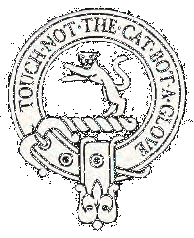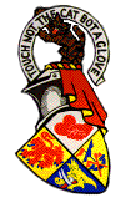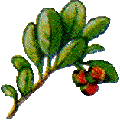Clan of the Cat | home
Site Index | Early Clan History | History | History Cont. | Yet Another Version | Mackintosh Chiefs | Sept Clans of MacKintosh | MacKintosh Battles | MacKintosh of Glenshee | Dalmunzie MacKintoshes | MacKintosh of Ballachraggan | MacKintosh of Finegand | MacKintosh of Cams | MacThomas-Mackintosh's | McCombie-Mackintosh's | Mackintoshs of Atholl | MacKintosh of Kyllachy | McIntosh of Holm | Mackintosh of Farr | Mackintosh of Dunkeld | McIntosh in NA. | Mackintosh Provosts | Col Anne MacKintosh | Chief Wm. McIntosh | Charles Rennie Mackintosh | Charles Macintosh Inventor | Wm Mackintosh of Borlum | John Mohr Mackintosh | Gen. Lachlan Mackintosh | Ewart Alan Mackintosh | Robert Mackintosh | Sir James Mackintosh 1765 | Donald McIntosh | Clan Chattan | Clan Shaw | Tartans | Arms & Clan Crest | Books about Mackintosh | Clan MacKintosh NA | Related Links | Web Awards
Arms & Clan Crest
The Clan crest badge may be worn by all members of the Clan.
It is denoted by the belt surrounding the crest of the chief. In the case of Mackintosh
it is a "Cat Salient"upon a wreath of colours
. 

The above crest is available as a pewter cap badge or kilt pin through Gaelicdreams.com.
Also available in heavy silver plate or sterling silver are the crest badge ,
pendant, cufflinks, tie-bar, key fob and tie-tack.
Visit our sponsor by clicking this link;
Gaelicdreams.com to purchase yours today.
Crests are available for all 200+ Clans including Clan Chattan.
The full achievement of the Chief of Mackintosh is shown on the opening page of this site , below
is the traditional way coat's of arms are portrayed in Scotland.

Plant Badge: Red Whortleberry

The plant badge worn by Clansmen is the Red Whortleberry which is found in abundance in forests, moors and in the slopes of the hills of Clan Chattan Country. In Gaelic it is known as Lus nam braoileg; in Latin, Vaccinium vitis-idaea and elsewhere the Cowberry. It flowers from May to August and from then until October produces a berry which gradually turns from green to a deep red.
CUMHA MHIC-AN-TOISICH (Macintosh's Lament)
This Lament is said to have been composed on the death, in the year 1526, of Lachlan, the fourteenth laird of MacIntosh. It has been supposed to have been in commemoration of William, who was murdered in 1550, by the Countess of Huntly. The words, however, are inconsistent with this latter veiw. The traditionary account is, that this Lachlan MacIntosh possessed a black horse of great power and beauty, but which, it was predicted, would be the cause of it's master's death. He rode it towards the church on his marriage day; but as it proved singularly unmanageable, he drew his pistol and shot it dead. Another horse - a piebald - was at once brought to him. On the return the bride and her party went first, the bridegroom and his friends following; hence her lament that she was not present when the fatal catastrophe occurred. When passing the body of the balck horse, the piebald shied so badly that MacIntosh was thrown to the ground, and killed on the spot. In a letter from the late Rev. Alexander MacGregor, of Inverness, to Mr. Alexander Carmichael, Cregorry, it is said: "Tradition also relates that the afflicted widow of the MacIntosh...not only composed the beautiful air of the Lament, but chanted it as she moved forward at the head of the bier at her husband's funeral, and marked the time by tapping with her fingers on the lid of the coffin. This, it is said, she continued to do for several miles, from the family castle at Dalcross to the burying-ground at Petty, and ceased not until she was torn away from the coffin, when it was about to be lowered into the grave."
IN SCOT GAELIC
Och nan och! leagadh thu! Och nan och! leagadh thu! Och nan och! leagadh thu! Am bealach a' ghairaidh! Is mise 'bhean mhuladach, Giulan na curraice, O'n a chualas aig gach duine, Gur ann na mhullach 'bha'm fabhar.
Leag an t-each cionnan thu, Leag an t-each cionnan thu, Leag an t-each cionnan thu, An ionad a' gharaidh. 'S i maideann ro dhubhach, Nach fhainichear tuilleadh mi O'n taca so 'n-uiridh O'n la chuireadh am fainn' orm.
'S truagh nach robh mis' an sin, 'S truagh nach robh mis' an sin, 'S truagh nach robh mis' an sin, 'S bheirinn air laimh ort. Is mis' tha gu tiursach, 'S tric snidh air mo shuilean, 'S mi 'g ionndrain an fhiurain, Marcaich' ur nan steud aluinn.
Marcaich an eich leumnaich dhuibh, Marcaich an eich leumnaich dhuibh, Marcaich an eich leumnaich dhuibh, Reub an t-eich ban thu. Cha teid mi gu bainis, Gu feill no gu faidhir; Gur ann toiseach an earraich, Fhuair mi an t-saighead a chraidh mi.
Eodhain Oig! leagadh thu! Eodhain Oig! leagadh thu! Eodhain Oig! leagadh thu! An clabar a' gharaidh! Gur mise tha tiursach, O'n chuir iad 's an uir thu; Thoir mo shoraidh le durachd, Gu tur nan clach arda!
Eodhain Oig! leagadh thu! Eodhain Oig! leagadh thu! Eodhain Oig! leagadh thu! Och! gu'n fhois domh 's mi lamh riut. Dhannsadh tu am feornain, Fo shroin do bhroig arda.
Och nan och! leagadh thu! Och nan och! leagadh thu! Och nan och! leagadh thu! Am bealach a' gharaidh.
ENGLISH TRANSLATION
Oh! my love, lowly laid, Oh! my love, lowly laid, Oh! my love, lowly laid, Beside the fatal wall-breach! Wife am I sorrowful, In my weeds of deep woe, Since I heard, with hear sore pained, That henceforth I must wear them.
Th' piebald horse laid thee low, Th' piebald horse laid thee low, Th' piebald horse laid thee low, Beside the fatal wall-breach. Maiden waesome sad am I, Whom scarce know they since the day When he fixed the marriage ring Then on my finger gaily.
Oh, alas! I wasn't there, Oh, alas! I wasn't there, Oh, alas! I wasn't there, By thy right hand to take thee. Oh! I am filled with grief, Tear-drops streaming down my cheek, Mourning for my youthful chief, Who newly rode the piebald.
Rider of th' bounding black, Bounding black, bounding black, Rider of th' bounding black, So mangled by the piebald. To the feast I'll not go, Nor where merriment fast flows; Since in waking of the spring, An arrow pierced me sorely.
My young Hugh lowly laid, Lowly laid, lowly laid; My young Hugh lowly laid, In debris of the wall-breach. I am sad, sore-sad and wae, Since in dust they low thee laid; My farewell I pray thee take, To stones in Dun high standing.
My young Hugh lowly laid, Lowly laid, lowly laid; My young Hugh lowly laid, Alas! and I not near thee. Thou couldst dance with grace and glee When they sang sweet melody; The grass-blade scarce would bend down be, By thy quick tread so lightly.
Oh! my love, lowly laid, Oh! my love, lowly laid, Oh! my love, lowly laid, Beside the fatal wall-breach!